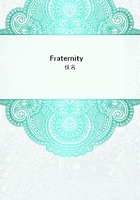
第11章
When in the preceding autumn Bianca began her picture called "The Shadow," nobody was more surprised than Hilary that she asked him to find her a model for the figure. Not knowing the nature of the picture, nor having been for many years--perhaps never--admitted into the workings of his wife's spirit, he said:
"Why don't you ask Thyme to sit for you?"
Blanca answered: "She's not the type at all--too matter-of-fact.
Besides, I don't want a lady; the figure's to be half draped."Hilary smiled.
Blanca knew quite well that he was smiling at this distinction between ladies and other women, and understood that he was smiling, not so much at her, but at himself, for secretly agreeing with the distinction she had made.
And suddenly she smiled too.
There was the whole history of their married life in those two smiles. They meant so much: so many thousand hours of suppressed irritation, so many baffled longings and earnest efforts to bring their natures together. They were the supreme, quiet evidence of the divergence of two lives--that slow divergence which had been far from being wilful, and was the more hopeless in that it had been so gradual and so gentle. They had never really had a quarrel, having enlightened views of marriage; but they had smiled. They had smiled so often through so many years that no two people in the world could very well be further from each other. Their smiles had banned the revelation even to themselves of the tragedy of their wedded state.
It is certain that neither could help those smiles, which were not intended to wound, but came on their faces as naturally as moonlight falls on water, out of their inimically constituted souls.
Hilary spent two afternoons among his artist friends, trying, by means of the indications he had gathered, to find a model for "The Shadow." He had found one at last. Her name, Barton, and address had been given him by a painter of still life, called French.
"She's never sat to me," he said; "my sister discovered her in the West Country somewhere. She's got a story of some sort. I don't know what. She came up about three months ago, I think.""She's not sitting to your sister now?" Hilary asked.
"No," said the painter of still life; "my sister's married and gone out to India. I don't know whether she'd sit for the half-draped, but I should think so. She'll have to, sooner or later; she may as well begin, especially to a woman. There's a something about her that's attractive--you might try her!" And with these words he resumed the painting of still life which he had broken off to talk to Hilary.
Hilary had written to this girl to come and see him. She had come just before dinner the same day.
He found her standing in the middle of his study, not daring, as it seemed, to go near the furniture, and as there was very little light, he could hardly see her face. She was resting a foot, very patient, very still, in an old brown skirt, an ill-shaped blouse, and a blue-green tam-o'-shanter cap. Hilary turned up the light. He saw a round little face with broad cheekbones, flower-blue eyes, short lamp-black lashes, and slightly parted lips. It was difficult to judge of her figure in those old clothes, but she was neither short nor tall; her neck was white and well set on, her hair pale brown and abundant. Hilary noted that her chin, though not receding, was too soft and small; but what he noted chiefly was her look of patient expectancy, as though beyond the present she were seeing something, not necessarily pleasant, which had to come. If he had not known from the painter of still life that she was from the country, he would have thought her a town-bred girl, she looked so pale. Her appearance, at all events, was not "too matter-of-fact." Her speech, however, with its slight West-Country burr, was matter-of-fact enough, concerned entirely with how long she would have to sit, and the pay she was to get for it. In the middle of their conversation she sank down on the floor, and Hilary was driven to restore her with biscuits and liqueur, which in his haste he took for brandy. It seemed she had not eaten since her breakfast the day before, which had consisted of a cup of tea. In answer to his remonstrance, she made this matter-of-fact remark:
"If you haven't money, you can't buy things.... There's no one I can ask up here; I'm a stranger.""Then you haven't been getting work?"
"No," the little model answered sullenly; " I don't want to sit as most of them want me to till I'm obliged." The blood rushed up in her face with startling vividness, then left it white again.
'Ah!' thought Hilary, 'she has had experience already.'
Both he and his wife were accessible to cases of distress, but the nature of their charity was different. Hilary was constitutionally unable to refuse his aid to anything that held out a hand for it.